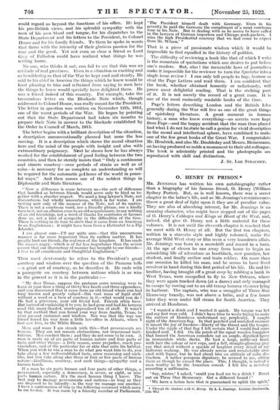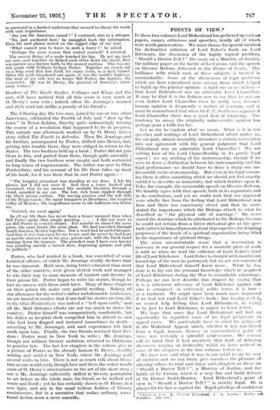0.: HENRY IN PRISON.*
Ma. JENNINGS has written his own autobiography rather than a biography of his famous friend, 0. Henry (William
Sydney Porter). But, as is well known, there was a secret chapter in the latter's life, and as Mr. Jennings's reminiscences throw a great deal of light upon it they are of peculiar value.
They are also of absorbing interest, for Mr. Jennings is an amazing character, who might have stepped out of the pages of 0. Henry's Cabbages and Kings or Heart of the West, and, indeed, did give 0. Henry not a little material for these volumes. It is not until the eleventh chapter is reached that we meet with 0. Henry at all. But the first ten chapters, written in a staccato style and highly coloured, make the average Wild West story or film seem a very humdrum affair.
Mr. Jennings was born in a snowdrift and reared in a barn. At the age of eleven he ran away from home to begin an astonishing life of adventure as bootblack, cow puncher, law student, and finally outlaw and train robber. On more than one occasion he killed his man, and he seems to have lived revolver in hand during this first period of his life. He and his brother, having brought off a great coup by robbing a bank -in West Texas, were compelled to fly to New Orleans, where they were again tracked down (at a dance) and only managed to escape by rowing out to an old tramp banana steamer lying in harbour. The captain, who was a smuggler of Three Star Hennessey brandy, was not above a bribe, and a few hours later they were under full steam for South America. They arrived at Honduras.
" I wanted a drink and I wanted it quick. Illy tongue was het and my feet were cold. I didn't have time to waste trying to make the natives of Honduras understand my perplexity. I caught sight of the American flag. In that parched and unslaked moment it meant the joy of freedom—liberty of the throat and the tongue. Under the ripple of that flag I felt certain that I would find some kindred soul. I did. On the porch of the squat wooden bungalow that housed the American consulate sat an ample, dignified figure in immaculate white ducks. He had a large, nobly-set head, with hair the colour of new rope, and a full, straight-glancing grey eye that noted without a sparkle of laughter every detail of myludicrous makeup. He was already serene and comfortably situ- ated with liquor, but he had about him an attitude of calm dis- tinction. A rather pompous dignitary, he seemed to me, sitting there as though he owned the place. This, I thought, is indeed a man worthy to be the American consul. I felt like a newsboy accosting a millionaire.
' Say, mister,' I asked, ' could you lead me to a drink ? Burnt out on Three Star Hennessey. Got a different brand ? '
' We have a lotion here that is guaranteed to uplift the spirit,'
• Through the Shadows with 0. Henry. By A. L. Jennings. London: Duckworth. [12s. ed.J
he answered in a hushed undertone that seemed to charge his words with vast importance.
' Are you the American consult' I ventured, also in a whisper.
No, just anchored here,' he smuggled back the information. Then his cool glance rested on the ragged edge of my coat.
What caused you to leave in such a hurry ? ' he asked.
`Perhaps the same reason that routed yourself,' I retorted.
The merest flicker of a smile touched his lips. He got up, took my arm, and together we helped each other down the street, that was narrow as a burrow bath, to the nearest cantina. This was my first jaunt with William Sydney Porter. Together we struck out on a long road that lost itself, for many years, in a dark tunnel. When the path broadened out again, it was the world's highway. The man at my side was no longer Bill Porter, the fugitive, the ex-convict. He was 0. Henry, the greatest of America's short- story writers."
Readers of The Gentle Grafter, Cabbages and Kings and the rest, will have noticed that all this scene is very much in 0. Henry's own vein ; indeed, often Mr. Jennings's manner and style read not unlike a parody of his friend's.
The following day the two men, joined by one or two other Americans, celebrated the Fourth of July and " shot up the town " in Texas fashion, thereby quite unknowingly turning the course of a revolution that happened to be in progress. This episode was afterwards worked up by 0. Henry into a story called The Fourth in Salvador. Then Mr. Jennings and his brother, accompanied by Porter, drifted into Mexico, but, getting into trouble there, they were obliged to return to the States. The two brothers held up a bank ; Porter did not join them in this, and parted from them, though quite amicably ; and finally the two brothers were caught and both sentenced to long terms of imprisonment. The writer was sent to Ohio Penitentiary, and his account of his life there takes up most of his book, for it was there that he met Porter again :-
" The hospital attendant was standing at my door. I felt his glance, but I did not meet it. And then a voice, hushed and measured, that to me seemed like sunlight breaking through a cloud, sounded in my ear. The low, rich tones rippled through the black prison curtain. The waving prairies and the soft hills of the Texas ranch ; the squat bungalow at Honduras ; the tropical valley of Mexico ; the magnificent scene in the ballroom was before me.
' Colonel, we meet again.'
In all my life there has never been a tenser moment than when Bill Porter spoke that simple greeting. . . . I did not want to sec Bill Porter in convict stripes. For months we shared the same purse, the same bread, the same glass. We had travelled through South America, Mexico together. Not a word had he said of his past. And here it was torn open for me to see, and the secret he had kept so quietly shouted out in his grey, prison suit, with the black band running down the trousers. The proudest man I have ever known was standing outside a barred door, dispensing quinine and pills to jailbirds."
Porter, who had worked in a bank, was convicted of some technical offence, of which Mr. Jennings stoutly declares that he was innocent. Both men, being better educated than most of the other convicts, were given clerical work and managed to win their way to some measure of comfort and decency in their prison life. Porter began to write his stories, though he had no success with them until later. Many of these chapters on their prison life make very painful reading. Making all due allowance for the writer's rather melodramatic tendencies, we are bound to confess that if one-half his stories are true, life in the Ohio Penitentiary was indeed a " hell upon earth," and all Mr. Mott Osborn's efforts are not too much to shrive his country. Porter himself was comparatively comfortable, but his duties as hospital clerk compelled him to attend to men who had been flogged and tortured (sometimes to death— according to Mr. Jennings), and such experiences left their mark upon him. Finally, the two friends received their free- dom : Porter went to New York to write ; Mr. Jennings, though not without literary ambition, returned to Oklahoma to practise law. The last few chapters in the volume give us a picture of Porter as the already famous 0. Henry, steadily writing and settled in New York, where Mr. Jennings paid several visits to him. There is not as much talk about litera- ture as one would wish, though here and there the writer recalls some of 0. Henry's observations on the art of the short story ; nor is Mr. Jennings sufficiently skilled in literary portraiture to set before us the whole man, his friend, as he walked and wrote and lived ; yet he has certainly shown us 0. henry in a new light, and not in the usual tedious fashion of literary reminiscence, but in a narrative that makes ordinary sensa tional fiction seem a mere soporific.











































 Previous page
Previous page